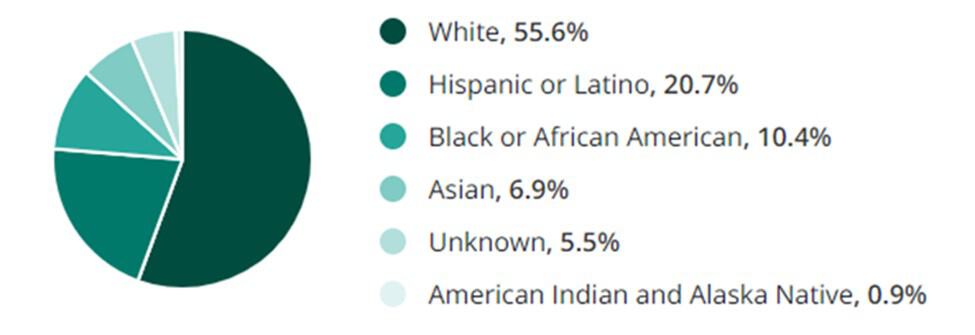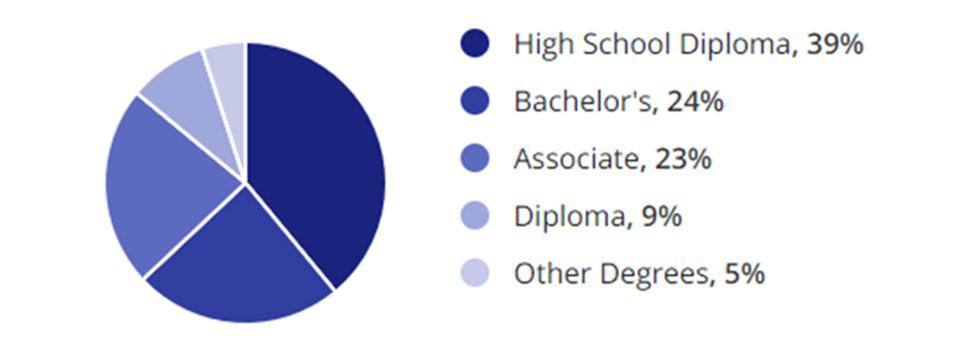Welcome to the ultimate guide for finding a career in warehousing logistics. This sector offers various job opportunities crucial in moving goods efficiently from manufacturers to consumers. With the world becoming increasingly interconnected, the demand for skilled professionals in warehousing and logistics has never been higher.
Whether you are taking your first steps into this field or looking to expand your career horizon, understanding the scope and potential of Warehousing-Logistics Jobs is essential. This guide provides a comprehensive overview of the educational requirements, areas of expertise, demographic insights, salary trends, and much more. It’s designed to give you the knowledge and tools to navigate the sector.
The importance of diversity in warehousing logistics jobs cannot be stressed enough. Diverse teams bring many perspectives that drive innovation, improve problem-solving, and contribute to a more inclusive work environment. This guide not only explores the opportunities within the industry but also emphasizes the significance of building a career in a field that values and promotes diversity.
As you embark on this journey, remember that the path to success in warehousing and logistics is as varied as its roles, from warehousing forklift operator jobs to top-level management positions. Let’s dive in and explore how you can carve out your unique path in the warehousing logistics sector.
Educational Requirements
Starting a career in Warehousing-Logistics is accessible with different educational backgrounds. Initially, a high school diploma might be enough for someone looking to start as a warehousing forklift operator or in other entry-level warehousing jobs. Yet, as you aim for growth or specialized roles like data warehousing jobs, further education becomes crucial.
For those aspiring to climb higher, pursuing degrees is beneficial. Logistics, supply chain management, or business administration are prominent fields of study that equip you with vital industry knowledge. Additionally, obtaining certifications can significantly enhance your credentials. Some notable certifications include:
- Certified Logistics Associate (CLA)
- Certified Supply Chain Professional (CSCP)
Acquiring such qualifications broadens your understanding and opens doors to advanced warehousing logistics jobs, including leadership and interstate warehousing jobs. Educational advancements empower you to tackle complex logistics challenges effectively.
If you’re transitioning from another career or looking to expand your options in education, resources like Embracing Career Change as a Diverse Candidate could provide valuable insights on leveraging your diverse background for a successful career in warehousing logistics.
Areas of Expertise
The Warehousing-Logistics sector offers a broad spectrum of specializations. Understanding these areas can guide your path to success, whether just starting or seeking to advance your career. Key areas of expertise include:
- Inventory Management: Critical for tracking and controlling warehouse stock levels.
- Supply Chain Management: Focuses on optimizing the flow of goods from suppliers to customers.
- Distribution Center Management: Involves overseeing the operations of distribution centers, ensuring efficient product movement.
- Fleet Management: Centers on managing the company’s vehicle fleet for deliveries and distributions.
- Operations Management: A broader role incorporating various aspects of warehousing and logistics to enhance efficiency.
- Logistics Analysis: Uses data to improve logistics processes, potentially leveraging specialties like data warehousing jobs.
- Compliance and Regulations: Ensures all warehousing and logistics operations adhere to legal and safety standards.
Each area demands a unique set of skills but also offers opportunities for those passionate about the warehousing-logistics industry. Whether your interest lies in being hands-on as a warehousing forklift operator or strategizing as a supply chain analyst, there’s a fit for you. It’s essential to identify your interests and strengths as you tread warehousing jobs and beyond, aiming for roles that match your expertise.
Demographics in the United States
A diverse work team supports the warehousing logistics sector in the United States. Understanding this industry’s demographics helps recognize diversity in creating a more dynamic and innovative work environment. Here’s the demographic breakdown by ethnicity/race, gender, and age.
Ethnicity/Race:
- White: 55.6%
- Hispanic or Latino: 20.7%
- Black or African American: 10.4%
- Asian: 6.9%
- Unknown: 5.5%
- Native American and Alaska Native: 0.9%

Gender:
- Male: 82.9%
- Female: 17.1%
The industry is primarily male, especially in roles involving manual labor and heavy machinery operation, like warehousing forklift operator jobs. Efforts are ongoing to foster inclusivity and ensure that women have equal opportunities across all job types within the warehousing and logistics sector.

Age:
Professionals in warehousing logistics jobs come from various age groups, with many individuals bringing different levels of experience and expertise. On average, the workforce is estimated to be around 39 years old. This diversity in age ensures a blend of fresh perspectives alongside seasoned insights into logistics operations and strategies.
Understanding these demographics is crucial for companies that build inclusive teams and job seekers looking to enter or grow within the sector. Encouraging a more diverse workforce can lead to innovative solutions and improvements in logistics efficiency, benefiting the industry. For more insights into the challenges and opportunities faced by diverse candidates in the workforce, consider exploring resources like Showcasing Diversity in Your Resume: Tips and Tricks.

Salary Trends
Salaries in Warehousing-Logistics Jobs vary widely by role, expertise, location, and experience level. From entry-level to specialized roles, understanding these trends can help individuals set realistic expectations, and companies design competitive compensation packages.
- Entry-level warehousing logistics jobs, such as warehousing forklift operator jobs, typically start around $35,000 annually.
- Roles and salaries range from $50,000 to $75,000 in mid-level logistics analysis and supply chain management jobs.
- Senior positions or highly specialized roles, such as interstate or data warehousing jobs, can exceed $100,000 annually.
It’s also worth noting that salaries may be higher in regions with a high demand for logistics professionals or where the cost of living is more significant. Moreover, additional certifications and degrees in logistics or related fields can boost earning potential, highlighting the value of continual learning and professional development within this industry.
The demand for skilled professionals continues to grow as the warehousing logistics sector adapts to new technologies and methodologies, such as intelligent warehousing and automation. This evolution underscores the potential for salary growth, particularly for those who stay abreast of industry innovations and refine their expertise accordingly.
Hiring Trends
The landscape for Warehousing-Logistics Jobs is on an upward trajectory, influenced by several key trends. Awareness of these can help job seekers position themselves effectively and guide employers in attracting the right talent.
Technological Advancements:
The push for digital transformation across the sector, including integrating IoT (Internet of Things), automation, and robotics in warehousing operations, is reshaping hiring priorities. There’s a growing demand for professionals skilled in managing and working with these technologies.
E-commerce Growth:
The explosion of online shopping has amplified the need for efficient warehousing and logistics services. This trend has increased the number of jobs available and broadened the scope of roles, from customer service to logistics software management.
Sustainability Practices:
There’s an increasing focus on sustainable practices within the industry. Companies are looking for individuals who can innovate and implement eco-friendly solutions in logistics operations, highlighting the sector’s shift towards green logistics.
Flexibility and Skills Diversity:
Employers are valuing flexibility and a diverse skill set more than ever. The ability to adapt to different roles within warehousing and logistics, such as shifting from traditional logistics to managing data warehousing jobs, can make candidates more attractive to prospective employers.
The ongoing evolution of the Warehousing-Logistics sector signifies a positive outlook for job growth and emphasizes the importance of adaptability and continuous learning for professionals. Keeping an eye on these trends can help job seekers and employers stay ahead in a competitive market.
For individuals interested in further exploring the broader implications of these hiring trends, especially concerning diversity within the workforce, the article Overcoming Adversity: The Struggles of Minority Students offers insights that resonate beyond educational challenges to professional opportunities and growth within various sectors, including warehousing logistics.
Education Levels
The diversity in education levels among professionals in the Warehousing-Logistics sector speaks to the wide range of roles and opportunities available. From entry-level positions making minimal formal education to specialized roles demanding advanced degrees, here’s a breakdown of the educational landscape within this dynamic industry.
High School Diploma or Equivalent:
Many entry-level warehousing jobs, including warehousing forklift operator positions, are accessible to those with a high school diploma or equivalent. These roles offer a starting point for those seeking to gain field experience.
Technical or Vocational Training:
Technical or vocational training programs can provide specialized skills related to logistics and warehousing operations. Certifications from these programs can enhance job prospects and pave the way for career advancement.
Associate’s and Bachelor’s Degrees:
Degrees in logistics, supply chain management, business administration, or related fields are increasingly sought after, especially for mid-level management positions. These degrees offer a deeper understanding of the supply chain, operations management, and strategic planning.
Advanced Degrees and Certifications:
For those aiming for senior management roles or specialized areas like data warehousing, an advanced degree such as a Master’s in Business Administration (MBA) focusing on logistics or supply chain management can be beneficial. Professional certifications like the Certified Supply Chain Professional (CSCP) designation can further elevate a candidate’s qualifications.
This diversity in educational requirements reflects the sector’s inclusivity, allowing individuals from various academic backgrounds to contribute to and thrive within the warehousing-logistics field. For those looking to broaden their career paths or enhance their educational credentials, exploring resources on career development for diverse candidates, such as Embracing Career Change as a Diverse Candidate, can provide valuable guidance and insights.

Skills in Demand
The Warehousing-Logistics sector values a diverse skill set, reflecting the complexity and dynamic nature of the field. As the industry evolves with technological advancements and changing market demands, specific skills stand out for individuals looking to excel in warehousing-logistics jobs. Here are some of the top skills that are currently in high demand:
Technical Proficiency:
- Understand logistics software and systems for inventory management, transportation management, and order processing.
- Knowledge of automation technologies, robotics, and the use of drones in inventory management.
Operational and Strategic Planning:
- Ability to devise efficient logistics strategies, optimizing supply chain operations to improve speed and reduce costs.
- Skills in forecasting demand and managing resources to meet business needs and customer expectations.
Problem-Solving:
- The capacity to identify issues swiftly and develop practical solutions is crucial in a fast environment where delays can have significant repercussions.
Communication and Collaboration:
- Strong communication skills for working with team members, suppliers, and customers.
- Ability to work as a team across different departments and with external partners to ensure smooth operations.
Sustainability and Ethical Practice:
- Understanding and creating sustainable logistics practices to reduce environmental impact.
- Commitment to ethical principles in supply chain management, ensuring fair labor practices and product integrity.
Continuous learning and professional development are essential for professionals looking to enhance or acquire these skills. With the industry’s growing emphasis on technology and conservation, staying updated on the latest trends and practices is essential. The sector’s diverse array of opportunities means there’s room for professionals with a wide range of talents and expertise, from those skilled in hands-on operational roles to strategists planning the logistics of tomorrow.
Current & Future Warehousing-Logistics Jobs Outlook
The outlook for Warehousing-Logistics Jobs is robust, marked by steady growth and an opening of an array of opportunities. Driven by global commerce, technological innovations, and the exponential rise of e-commerce, the demand for skilled professionals in the warehousing and logistics sectors is expected to continue its upward trajectory. Here’s what current and future trends indicate for job seekers and professionals within the industry:
Continued Growth:
- The e-commerce boom is significantly increasing the need for efficient warehousing and logistics services to manage online orders, returns, and exchanges.
- Advancements in technology such as automation, artificial intelligence, and machine learning are creating new job roles focused on tech integration and data analysis.
Diversity and Inclusion Efforts:
- Companies increasingly recognize the benefits of a diverse workforce, leading to more concerted efforts in recruitment practices and workplace policies.
- This trend improves the sector’s appeal to a broader range of job seekers and enhances team problem-solving and innovation.
Sustainability Initiatives:
- With a growing emphasis on environmental responsibility, jobs related to sustainable logistics and green supply chain practices are becoming more prevalent.
- Professionals with expertise in reducing carbon footprints and creating eco-friendly operations are in high demand.
Increased Competition and Qualification Requirements:
- As the sector grows, competition for top talent intensifies, encouraging professionals to continually upgrade their skills and qualifications.
- Higher education degrees and specialized certifications are becoming common prerequisites for advancement and entry into certain niche areas.
The future of Warehousing-Logistics Jobs looks promising, offering career stability and advancement opportunities for those ready to embrace the challenges of an ever-evolving landscape. For professionals committed to continuous learning and skill development, the warehousing and logistics field presents a rewarding pathway filled with diverse roles and pioneering projects. The key to success lies in staying adaptable, knowledgeable, and open to the myriad of changes shaping the future of global commerce and logistics.
FAQ’s
Do I need a degree to work in warehousing logistics?
No, not all positions in the Warehousing-Logistics sector require a degree. Entry-level jobs such as warehousing forklift operators are often available to those with a high school diploma or equivalent. However, advancing to specialist or management roles might require further education or certifications.
What skills are most sought after in the warehousing logistics industry?
Employers look for technical and soft skills, including skills in logistics software, operational and strategic planning, problem-solving, communication, and collaboration. Additionally, technical know-how in automation and sustainable practices is increasingly valuable.
Is the Warehousing-Logistics sector growing?
Yes, the sector is experiencing robust growth, driven by factors such as the surge in e-commerce, technological advancements, and an increased focus on renewable practices. This growth is anticipated to continue, expanding the demand for skilled professionals.
Can I transition to warehousing logistics from a different career?
Absolutely. The diverse nature of the Warehousing-Logistics sector means it’s possible to transition from various fields. Previous experience in project management, IT, customer service, or even roles emphasizing problem-solving and organizational skills can be beneficial. Targeted training and certifications can facilitate the transition.
How can I advance in my warehousing logistics career?
Advancement often requires a combination of experience and ongoing education. Higher education or professional certifications can open doors to management and specialized roles. Additionally, staying updated with industry trends and actively joining professional organizations can enhance career advancement opportunities.
These frequently asked questions shed light on the most common inquiries about starting and advancing in Warehousing-Logistics Jobs. As the sector evolves, so do the pathways to enter and progress within it, presenting myriad opportunities for dedicated professionals.
Additional Resources
A wealth of resources is available to deepen their understanding of the warehousing logistics sector or enhance their career prospects. From professional organizations to educational platforms, here are some valuable assets:
- The Council of Supply Chain Management Professionals (CSCMP) offers memberships, certifications, and opportunities for professionals interested in supply chain management.
- For insights into warehousing best practices and research, the Warehousing Education and Research Council (WERC) provides resources, industry benchmarks, and educational events.
- The Association for Supply Chain Management (ASCM) features certification programs, training, and community engagement for supply chain professionals.
- Students and professionals can explore logistics and supply chain courses through educational platforms like Coursera and edX, which offer access to programs from universities and colleges worldwide.
These resources can help new candidates and professionals in warehousing logistics Jobs stay abreast of industry changes, refine their skills, and build a robust professional network. Leveraging these tools can significantly impact your career path.
Conclusion
The warehousing logistics sector presents opportunities for individuals passionate about giving to the global supply chain. With diverse roles, from positions like warehousing forklift operator jobs to strategic management and technological innovation, this field offers career paths that cater to various interests and skills. As trends such as e-commerce growth, technological advancements, and conservation continue to shape the industry, the demand for skilled professionals is set to rise even further.
Education and continuous learning are pivotal in helping individuals with the necessary skills to thrive in this dynamic environment. Whether you’re just starting your diversity job search or looking to advance, staying updated on industry trends and growing your skill set cannot be stressed enough.
As part of our commitment to helping diversity within the workplace, we encourage you to join Diversity Employment. Becoming a member will give you visibility among top employers committed to diverse work environments.




